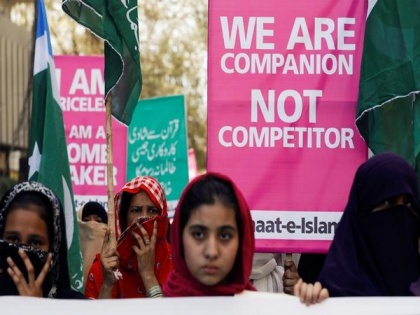16pc women in Pakistan's Quetta are employed, survey finds
By ANI | Published: April 3, 2023 06:10 AM2023-04-03T06:10:00+5:302023-04-03T06:10:06+5:30
Quetta [Pakistan], April 3 : Only 16 per cent of the working-age women in Pakistan Quetta participate in the ...

16pc women in Pakistan's Quetta are employed, survey finds
Quetta [Pakistan], April 3 : Only 16 per cent of the working-age women in Pakistan Quetta participate in the labour market, the World Bank report revealed, according to Dawn.
The 'Women in the Workforce in Quetta' survey, which was carried out by World Bank, showed that women employed in low-value-added activities, with a high prevalence of own-account, informal, and home-based work.
Compared to women, 72 per cent of men participate in the labour market. At the same time, they perform jobs in line with socially accepted occupations.
As per the report, working women are basically employed in the manufacturing hub as garment and handicraft workers and the minority of highly educated perform in more skilled jobs such as teachers or health professionals. Representation in other nontraditional sectors is very low, Dawn reported.
The survey pointed out that social norms seem to be the most powerful factor in determining women's interactions with the public sphere and workforce. Household attitudes and behaviour and social norms play an important role in determining whether, when, and how women can work for pay.
World Bank study shows 78.6pc employed women are home-based workers with low upward mobility.
According to Dawn, long-term policy efforts are needed to influence social norms to encourage women's empowerment. Research indicates that possible interventions to influence norms include the strategic use of positive messaging about strong female role models.
As demonstrated by a large body of evidence and the Peshawar and Quetta household surveys, women are more likely to be involved in the labour force if they are more educated. Addressing both demand and supply constraints that limit girls' education remains a key priority. Similarly, a lack of marketable skills can discourage women from seeking jobs, reported Dawn.
Most employed women (78.6pc) in urban Quetta are home-based workers (HBWs) who are largely employed in informal jobs of low upward mobility. For women, working from home is an alternative used to work around existing social norms. Effective implementation of recent legislation to recognize the status of HBWs can improve women's economic participation in the province.
Disclaimer: This post has been auto-published from an agency feed without any modifications to the text and has not been reviewed by an editor
Open in app